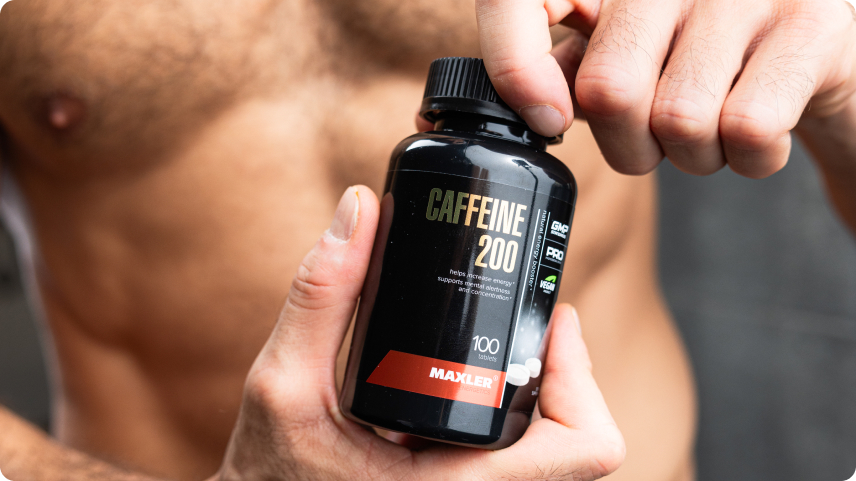The Effect of Caffeine on Athletic Performance

How does caffeine work?
Caffeine is a stimulant of the central nervous system (CNS). In the brain, it blocks the effects of a chemical called adenosine, which makes you feel sleepy. You then feel more alert and energetic, which is why many people drink coffee or tea to stay awake.
The effects of caffeine are different from person to person. This is something you may have experienced yourself; maybe you can drink a cup of coffee before going to bed, while your partner can't sleep if he/she consumes caffeine after lunch.
Why are responses to caffeine so individual?
Well, as you can imagine, the answer is complex and is linked to our genes, but not only. Currently, variation in two genes, called CYP1A2 and ADORA2A, has been shown to affect the performance-enhancing effects of caffeine. A small change in the CYP1A2 gene can predispose people to be “rapid” or “slow” caffeine metabolizers.
If you are a fast metabolizer, you metabolize caffeine faster, so the effects of caffeine should last for a shorter time. Does this sound negative? Well, it may actually be that the molecules that caffeine is broken down into also improve performance, which means being a fast metabolizer could be beneficial.
The second ADORA2A gene encodes an adenosine receptor. When adenosine binds to this receptor it makes us feel tired. Caffeine competes with adenosine for adenosine receptors and by doing so improves our performance. In other words, the more caffeine binds to these receptors, the less adenosine can do so. As a result, we feel less tired and sleepy.
But genes aren't everything of course, and differences in our environment also contribute to the inter-individual response to caffeine consumption. Additionally, differences in how caffeine is consumed, such as dose, timing, source, all impact how much caffeine improves our performance.

Caffeine supplements for athletes
Different delivery mechanisms can be used to obtain the benefits of caffeine: from coffee to sports nutrition products (gels, gums, bars, etc), energy drinks (e.g. Red Bull, guarana, Coca-Cola, etc..), to caffeine injections and tablets.
Chewing gums have a quicker absorption compared to other products that have generally a delay of at least ~20-30 minutes before they get a noticeable effect, and it takes about 60 minutes for the caffeine to reach a peak in the blood. This is because caffeine must be absorbed, pass through the liver and enter the circulation before it can affect the central nervous system.
Why is there faster absorption of caffeine with gum? Because caffeine is absorbed through both the oral and oesophageal mucosa, some of it being residually absorbed in the gastrointestinal tract. The rate of absorption at which caffeine will reach plasma in sufficient concentrations will be faster therefore performance picks will be reached in shorter time than if we take caffeine tablets, capsules, etc.
Regarding coffee to drink, the quantities of caffeine vary depending on the way it is prepared. Espresso coffee provides the highest concentration (but is served in much smaller quantities), percolated or boiled coffee provides higher concentrations than drip, filter, French press or plunger coffee. So in this case if you want to know exactly how much caffeine you are ingesting, coffee may not be the preferred way, due to the variation.
Maxler recommends. You can reap the benefits of caffeine as a supplement, which is particularly convenient for athletes. Maxler Caffeine 200 is a great, healthy caffeine supplement for those needing an energy boost. Each tablet delivers 200 mg of caffeine.
Implications for sport
Now let's take a deeper look at how caffeine can benefit athletes:
- Improved Endurance: Consuming caffeine supplements by athletes before exercise has been shown to prolong endurance in aerobic activities. This is achieved by promoting the use of fat as a fuel source, preserving glycogen stores in the muscles for longer-lasting energy.
- Increased concentration and attention: by stimulating the central nervous system, caffeine increases athletes attention and mental alertness, which is essential for sports that require concentration and precision. This mental acuity can be a game-changer in the most intense competitions and training sessions.
- Reduced perception of exertion: Caffeine has been found to reduce the level of perceived exertion during exercise. This can lead to improved performance, as athletes are able to undertake effort for longer periods.
- Faster reaction times: The stimulating effects of caffeine can also speed up reaction times, benefiting fast sports where split-second decisions can make the difference.
- Improved strength and power: Studies suggest that caffeine intake can increase muscle strength and power, such as weightlifting or sprinting.
Times of caffeine intake for athletes
For events lasting less than 2 hours, the ideal time to consume caffeinated chewing gum is in the 15 minutes before the start of exercise, faster than when ingested via more standard procedures such as capsules, coffee, pills etc. (~60 minutes).
For longer events of more than 2 hours the approach of taking healthy caffeine supplement before exercise may be more complex. Is it better to "peak" in the first hour or would caffeine intake be better later during exercise to avoid having to refuel and ingest large amounts of caffeine?
The optimal dose is likely determined individually, and if you suffer from negative side effects of caffeine it is wise to minimize your caffeine intake. However, to get an idea, you could take caffeine before the event and for example, if in a trail race the final climb takes place 60 minutes before the finish, it is recommended to take 40-60 minutes of caffeine before that climb.
Suggested doses are similar across all forms, i.e. ? 3 mg/kg body mass (BM), which would correspond to 270 mg for a 90 kg individual. Although no studies to date have used the maximum recommended dose of 6 mg/kg of body mass, it would be ideal to avoid higher doses to prevent negative side effects, such as anxiety, nervousness and gastrointestinal disorders.

Is it necessary to abstain from coffee to get the maximum effect from caffeine?
No, many people think it's best to abstain to get the maximum effect from caffeine. But in reality, even if this idea seems rather attractive, it is fair to conclude that all the studies carried out demonstrate that abstinence from caffeine to obtain a better caffeine effect is a myth. It is therefore better to maintain normal caffeine consumption during competition preparation.
Does coffee dehydrate?
We often read that coffee or caffeine sports drink dehydrates. Does caffeine or coffee really dehydrate you? Or can you drink these drinks and do they contribute to your daily fluid needs?
Coffee, when consumed in moderation by people accustomed to caffeine, provides hydrating qualities similar to water.
Can coffee boost your metabolism and help you burn fat?
Caffeine intake may produce an increased fat oxidation. But fat oxidation and weight loss are not the same thing, if you increase fat oxidation it doesn't mean you are losing weight at the same time. You can only lose weight if you have a kcal deficit. The increase in fat oxidation depends on the dose of caffeine taken but also on the intensity of the exercise you do.
To summarize
It appears that the primary mechanism by which caffeine can improve performance in a wide variety of sports is through its effect on blocking the action of adenosine, resulting in reduced fatigue and attenuated pain sensation. It also improves alertness and reaction time. It's possible that caffeine can increase the strength of muscle contraction, but if that happens it probably doesn't have much of an effect. Caffeine does not appear to cause glycogen sparing despite its effects on adrenaline and fat burning.
It is important to note that too much caffeine can have the opposite effects and that the effects of caffeine are highly individual. Careful experimentation is probably the best way to find out what works for each individual.



